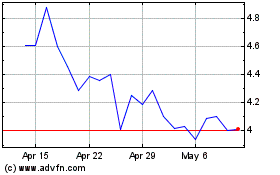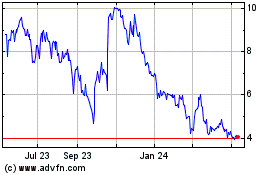SAB Biotherapeutics (Nasdaq: SABS) (the “Company” or “SAB”), a
clinical-stage biopharmaceutical company with a novel immunotherapy
platform developing a human anti-thymocyte immunoglobulin (hIgG)
for delaying the onset or progression of type 1 diabetes (T1D),
today announced that Jay Skyler, MD, MACP, FRCP has been appointed
to the company’s Board of Directors.
“Dr. Skyler’s appointment to our Board of Directors is a major
milestone for SAB,” said Samuel J. Reich, SAB’s chairman and Chief
Executive Officer. “His deep expertise in type 1 diabetes research
and leadership in the field will provide insights that will be
invaluable to our SAB-142 program. Speaking on behalf of the Board,
we are honored to add Dr. Skyler to the Board of Directors and look
forward to his contributions as we continue to advance a
disease-modifying therapy.”
“I look forward to a future where we may delay the onset or
progression of type 1 diabetes, and I’m optimistic about SAB’s
potential role in that milestone with the novel approach of
SAB-142,” noted Dr. Skyler of his appointment. “Disease
modification is a nascent but critically important field,
particularly in type 1 diabetes where prevention of immune
destruction and preservation of beta cell mass or function are both
considered ideal therapeutic goals.”
Dr. Skyler’s career in diabetes spans more than five decades,
and he is currently a Professor of Medicine, Pediatrics, &
Psychology, in the Division of Endocrinology Diabetes &
Metabolism, Department of Medicine, University of Miami Leonard M.
Miller School of Medicine, Miami, Florida, where he served as
Director of that Division from 2000 to 2004. From 1993 until 2015,
he was Chairman of the NIH (NIDDK)-sponsored Diabetes Prevention
Trial - Type 1 (DPT-1) and its successor Type 1 Diabetes TrialNet,
a nationwide (and global) network conducting clinical trials to
interdict type 1 diabetes.
He is Deputy Director for Clinical Research and Academic
Programs at the Diabetes Research Institute, University of Miami,
where he previously was Area Leader for Immunomodulation and
Tolerance. He also is a Member of the University of Miami
Interdisciplinary Stem Cell Institute.
A native of Philadelphia, Dr. Skyler is a graduate of
Pennsylvania State University and Jefferson Medical College, and
did his postgraduate training in Internal Medicine and in
Endocrinology & Metabolism at Duke University Medical
Center.
About SAB-142
SAB-142 is a human alternative to rabbit anti-thymocyte globulin
(ATG). SAB-142’s mechanism of action is analogous to that of rabbit
ATG, which has been clinically validated in multiple clinical
trials T1D, demonstrating the ability to slow down disease
progression in patients with new or recent onset of Stage 3 type 1
diabetes.
Two clinical trials have shown that a single, low dose of rabbit
ATG has demonstrated the ability to modulate the body’s immune
response to help slow beta cell destruction and preserve the
ability of these cells to generate insulin, which the body needs to
regulate blood sugar and carry out all human activities.
SAB-142, like rabbit ATG, directly targets multiple immune cells
involved in destroying pancreatic beta cells. By stopping immune
cells from attacking beta cells, this treatment has potential to
preserve insulin-producing beta cells. However, most humans treated
with rabbit ATG develop serum sickness and anti-drug antibodies
from exposure to the rabbit-derived antibody. SAB-142 is a human
antibody, intended to allow safe, consistent re-dosing for type 1
diabetes, a lifelong chronic disease, without the potential risk of
inducing the major adverse immune reactions that can occur with
administration of an animal ATG.
About SAB Biotherapeutics, Inc.
SAB Biotherapeutics (SAB) is a clinical-stage biopharmaceutical
company focused on developing human, multi- targeted, high-potency
immunoglobulins (IgGs), without the need for human donors or
convalescent plasma, to treat and prevent immune and autoimmune
disorders. The Company’s lead asset, SAB-142, targets T1D with a
disease-modifying therapeutic approach that aims to change the
treatment paradigm by delaying onset and potentially preventing
disease progression. Using advanced genetic engineering and
antibody science to develop Transchromosomic (Tc) Bovine™, the only
transgenic animal with a human artificial chromosome, SAB’s
DiversitAb™ drug development production system is able to generate
a diverse repertoire of specifically targeted, high-potency, human
IgGs that can address a wide range of serious unmet needs in human
diseases without the need for convalescent plasma or human donors.
For more information on SAB, visit: https://www.SAB.bio/ and follow
SAB on Twitter and LinkedIn.
Forward-Looking Statements
Certain statements made in this current report that are not
historical facts are forward-looking statements for purposes of the
safe harbor provisions under The Private Securities Litigation
Reform Act of 1995. Forward-looking statements generally are
accompanied by words such as “believe,” “may,” “will,” “to be,”
“estimate,” “continue,” “anticipate,” “intend,” “expect,” “should,”
“would,” “plan,” “predict,” “potential,” “seem,” “seek,” “future,”
“outlook,” and similar expressions that predict or indicate future
events or trends or that are not statements of historical matters.
These forward-looking statements include, but are not limited to,
statements regarding future events, including, the impact members
of SAB’s leadership team will have on the Company’s business and
results of operations, and the development and efficacy of our T1D
program and other discovery programs.
These statements are based on the current expectations of SAB
and are not predictions of actual performance, and are not intended
to serve as, and must not be relied on, by any investor as a
guarantee, prediction, definitive statement, or an assurance, of
fact or probability. These statements are only current predictions
or expectations, and are subject to known and unknown risks,
uncertainties and other factors which may be beyond our control.
Actual events and circumstances are difficult or impossible to
predict, and these risks and uncertainties may cause our or our
industry’s results, performance, or achievements to be materially
different from those anticipated by these forward-looking
statements. A further description of risks and uncertainties can be
found in the sections captioned “Risk Factors” in our most recent
annual report on Form 10-K, subsequent quarterly reports on Form
10-Q, as may be amended or supplemented from time to time, and
other filings with or submissions to, the U.S. Securities and
Exchange Commission, which are available at https://www.sec.gov/.
Except as otherwise required by law, SAB disclaims any intention or
obligation to update or revise any forward-looking statements,
which speak only as of the date they were made, whether as a result
of new information, future events, or circumstances or
otherwise.
CONTACTS
Media Relations:
khollon@sab.bio
Investor Relations:
matt@milestone-advisorsllc.com
SAB Biotherapeutics (NASDAQ:SABS)
Historical Stock Chart
From Oct 2024 to Nov 2024

SAB Biotherapeutics (NASDAQ:SABS)
Historical Stock Chart
From Nov 2023 to Nov 2024
